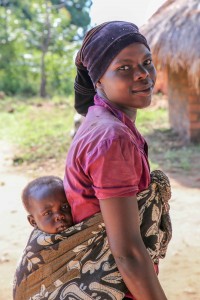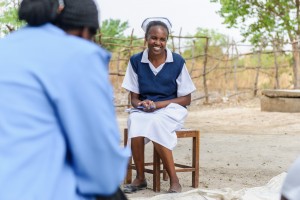UNFPA and the Clinton Health Access Initiative, Inc. (CHAI) work closely in Cameroon to increase access to family planning services and improve supply chain management in support of the Ministry of Public Health.
Since the start of the UNFPA/CHAI collaboration in late 2013, we have helped enable more than 37,000 additional women access to contraceptive choice. “This UNFPA-CHAI partnership is a natural fit: while UNFPA is the country’s major source of policy and program support for family planning commodities and service delivery, CHAI provides analytical and logistics assistance to support accurate commodity distribution and data-driven deployment of family planning interventions,” explains Barbara Sow, UNFPA Cameroon Representative. The Ministry of Public Health’s (MOH) Sub-Director of Reproductive Health, Dr. Seidou Moluh, adds that this collaboration is “strengthening systems to make family planning work in Cameroon.”
Improving family planning availability and access
UNFPA and CHAI have used data-driven analysis to target priority areas for training and commodity management, enabling more effective programming. For example, informed by a mapping exercise identifying trained health workers, CHAI helped the MOH to identify one region, the South Region, in Cameroon without a single trained family planning provider. UNFPA subsequently shifted resources to train over 130 providers there, where the need was greatest. Following the training, consumption of contraceptives in the region tripled between Q2 and Q4 of 2014. Thus far in 2015, monthly consumption of long-acting reversible contraceptives (LARC) in the region is double that of 2014. During that time period, the percentage of health facilities staffed with an appropriately-trained family planning provider in the South Region increased from 0 percent to 36.2 percent.
Increasing supply chain efficiency
UNFPA procures the majority of contraceptive products for both the public sector and non-governmental organizations in Cameroon, and according to Katherine Kalaris, CHAI’s Family Planning program manager in Cameroon, “increased funding through the Global Programme to Enhance Reproductive Health Commodity Security (GPRHCS) has had a major impact on increasing commodity security.” CHAI assists UNFPA and the MOH to quantify and monitor the flow of these contraceptives through the supply chain. Through rigorous tracking of regional stock levels, consumption, and anticipated increases due to service delivery investments, and by improving communication with regional medical stores, regional stockouts have plummeted from 45 percent to less than 10 percent. In early 2014, CHAI and UNFPA helped the MOH to identify a potential stockout of Jadelle and UNFPA subsequently increased their 2014 procurement, avoiding a disruption of supply. “Combining additional GPRHCS funding from UNFPA with an improved contraceptive forecast with help from CHAI, has helped the MOH to prevent national stockouts,” noted Kalaris. “No stockouts have been experienced in 2014 or 2015.”
Establishing the first eLMIS in Cameroon
UNFPA is supporting the MOH to develop procurement and rollout the electronic logistics management information system (eLMIS) for pharmaceuticals through support from the Bill & Melinda Gates Foundation and the RMNCH Trust Fund, with CHAI providing technical assistance and coordinating the process. The eLMIS will provide transparency into the supply chain and enable more real-time monitoring of stock, which will allow the MOH to more effectively monitor stock levels and ensure that commodities are in the right place at the right time.
Results of an effective partnership
During the last two years, UNFPA and CHAI’s collaborative relationship has helped the MOH to strengthen and expand coverage of family planning products and services in Cameroon. “After a history of chronic stockouts of family planning commodities in the country, there is now a sufficient and consistent supply of contraceptives supported by UNFPA through the GPRHCS, and improved management of those contraceptives with help from CHAI,” said Sow. The partnership and continued joint advocacy work have helped the MOH renew its commitment to increasing contraceptive prevalence and enabling women to access family planning services.
CHAI and UNFPA work in many of the same countries, and are mutually interested in increasing access to family planning services. Future collaborations could extend similar benefits seen in Cameroon to other countries, particularly related to improving contraceptive security and targeting service delivery interventions.
*This article was previously posted on the UNFPA Cameroon website on October 21, 2015.







